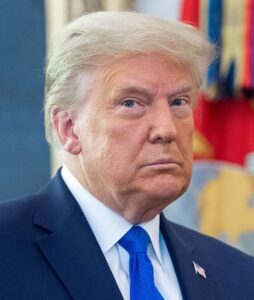 Everybody’s writing books now, including Maggie Haberman, a well-connected New York Times journalist (bio here).
Everybody’s writing books now, including Maggie Haberman, a well-connected New York Times journalist (bio here).
Haberman’s book, CNN political writer Chris Cillizza says (here), makes clear Trump’s election claims aren’t just for crowd consumption, but are something he seems to really believe. Where does that come from?
To find an answer, Cillizza dug into Trump’s psychology: His “cavalier view” of boundaries, his egocentricity (e.g., viewing “the military as his personal plaything” and wondering “why the Justice Department wasn’t doing his bidding”), and what Cillizza calls Trump’s “blind spot” regarding America’s democracy.
This was predictable. Even before Trump took office in 2017, I figured something like that would happen. Why? Because (1) Trump has no government background, nor understanding of how government works in our country, and (2) he’s used to running a family business where he’s the unquestioned boss, and adjusting to the give-and-take of democratic governing is a tough adjustment to make, especially if you don’t want to make it.
Time and again, I’ve seen people of both parties who came into government from the business sector fail. Why is that? The primary reason is that running a business and governing are very different. Business and public management require different skill sets, which is why universities have separate departments of business and public administration.
Generally speaking, someone who comes from business doesn’t know how to manage in an environment involving stakeholders, public input, and where the objective isn’t cost-consciousness but achieving program objectives. For example, if you’re in charge of street repairs and your budget to fix potholes is $1 million, but you spend only $500,000 and fill only half the potholes, you didn’t do your job. You weren’t supposed to save the city $500,000; you were supposed to fix all of the potholes.
Trump’s psychology and thought process certainly have a bearing on his insistence that he won the election. But that doesn’t tell us why his followers, against all evidence, also believe he won the election. Clearly, they’re not basing that on the election results, which show Biden getting 7 million more votes than Trump, and winning more than enough electoral votes.
To try to understand this, I’ll first turn to a March 1, 2021, article (here) in the American Thinker, a conservative online magazine, titled “Trump knows he won the election”:
“During his speech at CPAC on Sunday afternoon, Donald Trump made no bones about the fact that he won the 2020 election. The reason he’s not in the White House is because of a system that was reconfigured for fraud and a cowardly Supreme Court. … Trump explained that state changes to election processes that bypassed their legislatures were unconstitutional. Trump also noted his extraordinary coattails. One hundred twenty out of 122 House candidates whom he endorsed won. … And Trump himself did spectacularly: “I received almost 1.5 million more votes than all of the Republican House candidates combined. So how the hell is it possible that we lost? It’s not possible. I got … more votes than … any incumbent president in the history of our country, almost 75 million votes.” Trump noted that he got 12 million more votes than in 2016; carried Florida, Ohio, and Iowa by large margins; and won 18 of America’s 19 bellwether counties.”
Note what he’s doing here: Pointing to various indicia that suggest he should have won, and blaming the actual vote totals on fraud and changes to the voting system. (Republicans got especially worked up over accommodations made to voters because of the Covid-19 pandemic.)
Another example of this is a reader’s letter to a local West Virginia newspaper here. He talks about “a lot of mail-in ballots mailed to prospective voters with little or no cross checks” (which isn’t true; mail ballots are verified against voter rolls), and says, “How do I know this, because a lot of whistleblowers have come forward. Where there is smoke there always is fire.” (What whistleblowers?)
Parenthetically, Wikipedia notes (here) that American Thinker admitted publishing false statements from “discredited sources” about the election; but I think the above quote offers some insight into why Trump and his followers are skeptical of the prima facie election results, and there’s more to their denialism than just disappointment over losing.
I found other articles published in January 2021 that delve into crowd psychology, and the tendency of people to hold onto what they want to believe, in articles here and here. This is covering old ground, but is essential to understanding mass delusions and widespread acceptance of conspiracy theories.
I believe what it comes down to is Trump and his supporters wanted to win, and think he should have won, so they look past the vote totals for anything that might suggest he did win. Mike Lindell, the MyPillow guy, kind of specializes in this. This is also why you see, for example, Michigan Trumpers breaking into voting machines in a quixotic search for signs of tampering or hacking; and why Republicans have paid millions for fruitless recounts and “audits” that did nothing but reaffirm the official results.
Essential to this belief system, of course, is shutting out the fact that 81 million of us wanted a different result, or if not that, then refusing to accept that our votes also deserve to be counted.
This is why we certify elections; certifying makes results official and final, is based on the actual vote tallies, and shuts down those kinds of arguments, or at least shoves them into the realm of speculation and coffee shop talk, which is where they belong.
Related story: Maggie Haberman is accused of withholding information about Trump to further her own book deal interests, see story here.